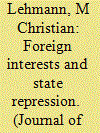| Srl | Item |
| 1 |
ID:
131427


|
|
|
|
|
| Publication |
2014.
|
| Summary/Abstract |
Adolf Hitler's experiences during the First World War have been much discussed, with historians tending to concentrate on his involvement in the fighting and the operational lessons he later claimed to draw. Much less has been written about the impact of the war on his world view, though recent work has tended to suggest that his paranoid anti-Semitism was not yet visible during the conflict. Drawing on this latest research, but also on newly discovered sources and previously underused material, the author shows that Hitler's main preoccupation during the war and its immediate aftermath was the overwhelming power of Great Britain and its American ally. He associated these two powers with the alleged international Jewish economic conspiracy that had crushed the German empire. Hitler's anti-Semitism thus originated in an anti-capitalist, rather than anti-communist, discourse. He blamed Britain and the US for the rigours of the Versailles peace settlement, a moment which was far more politically formative for him than the experience of defeat itself. His encounter with American soldiers in the summer of 1918 also marked his first engagement with the global power of the United States and the start of a belief in the demographic weakness of the German empire which inspired his plans for Lebensraum in the east.
|
|
|
|
|
|
|
|
|
|
|
|
|
|
|
|
| 2 |
ID:
190842


|
|
|
|
|
| Summary/Abstract |
Existing work seeks explanations for state repression mainly in domestic factors such as ethnic/religious cleavages, poverty and inequality, struggle for power, regime type and quality of state institutions, lack of loyalty, demand for scapegoats, and cultural or psychological traits of perpetrators. How foreign influences shape state repression has been given less attention. Furthermore, the focus of the empirical literature has been largely cross-country, leaving much local variation unexplained. In this article, I examine how far foreign interests can explain the local (spatial) variation of deportations and massacres during the Armenian genocide. Between 1915 and 1917 the Ottoman Empire carried out a massive campaign of state repression (deportations and massacres) against its Armenian population. There was meaningful variation across Ottoman provinces in the intensity of this campaign, that is, some provinces experienced more repression than others. I investigate the determinants of this spatial variation. My empirical analysis is guided by a rationalist (economic) model where deportation is a tool to stifle Armenian calls for independence, but the benefit and cost of deportation vary spatially. For example, deportation is costlier (i.e. the risk of foreign intervention is greater) in locations where foreign economic and military interests are threatened by the departure of Armenians. In line with the model’s predictions, my empirical analysis indicates that there were fewer deportations in places where Armenians worked for the German-owned railway.
|
|
|
|
|
|
|
|
|
|
|
|
|
|
|
|